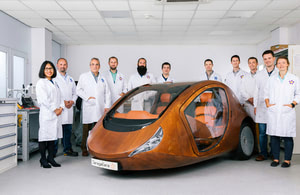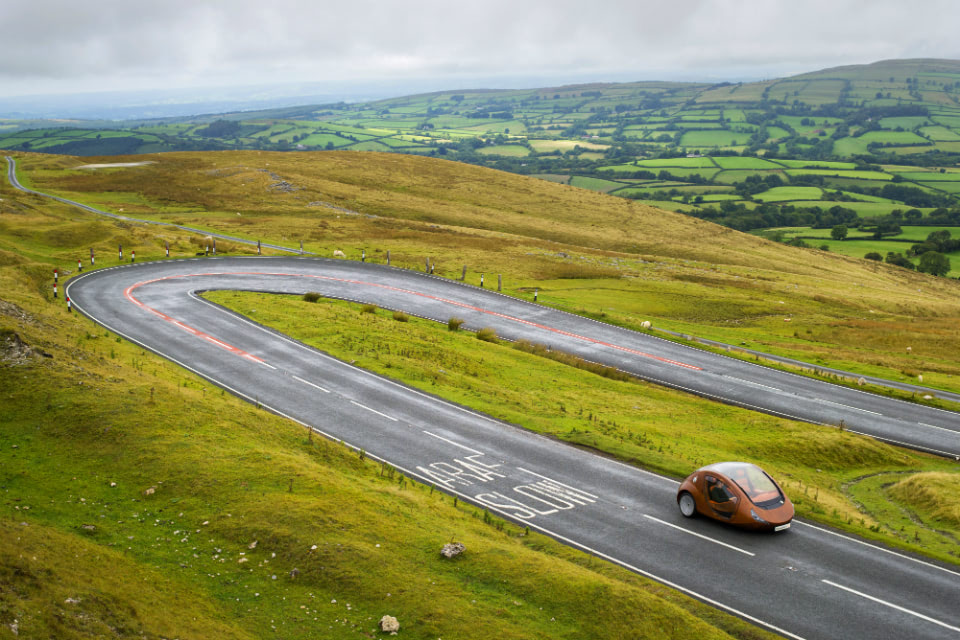University partnership improving the range of electric vehicles through the Industrial Strategy Challenge Fund

@UniSouthWales & @UniofHerts are improving the range of electric vehicles through the Industrial Strategy Challenge Fund
Through the Industrial Strategy Challenge Fund, a Welsh materials company is working on hybrid battery technology to support electric vehicle adoption. Working in partnership with the University of South Wales and the University of Hertfordshire, the intention is to test the idea with input from industry.
Caerphilly-based Deregallera is developing a new hybrid energy storage system to extend the life of an electric vehicle battery by 50%.
The project is funded through the Faraday battery challenge, which is part of the Industrial Strategy Challenge Fund.
How to handle higher power demands
This project is addressing current issues with electric vehicle batteries. It should increase the range and decrease the risk of energy loss in electric vehicles.
It will do this by combining supercapacitors with traditional lithium-ion batteries to produce a pack that is better suited to handling higher power demands.
A supercapacitor is an energy system that allows for faster charging, but has limited energy storage. Conversely, a lithium-ion battery pack can store larger amounts of energy but is slower to charge.
Managing Director, Martin Boughtwood explained that the battery makes up around half of the cost of an electric car. By increasing battery life by 50%, the cost of maintaining the vehicle will be significantly reduced because it won’t need to be replaced as often.
It will also have an environmental impact because batteries with a longer life mean less raw materials will need to be mined and used over time.
Martin said:
“There is an extensive list of issues associated with the mining, manufacture, production and use of lithium-ion battery packs.
“While we progress alternative technologies, extending the lifetime of lithium-ion battery packs and reducing production needs has significant ramifications in an increasingly environmentally-conscious world.”
Protecting battery life
The stop-and-start nature of driving can cause irreversible degradation of a modern electric vehicle’s battery. This includes reducing its ability to hold charge, limiting the range and increasing the risk of fire.
On how supercapacitors could help, Martin explained:
Supercapacitors are ideally suited to handling the high-power spikes in energy recovery or demand – but they currently do not have sufficient energy density to satisfy the range requirements of modern electric vehicles on their own.
A hybridisation approach – combining supercapacitors and lithium-ion batteries – means that the battery pack will better handle the spikes that occur with frequent acceleration.
Addressing the challenges of hybridisation
The success of Deregallera’s project rests on the degree to which it can reduce the mass and volume of the supercapacitors in the pack.
Kat Hunter, Materials Specialist at Deregallera, said:
“The benefits of hybridisation have to outweigh the mass and volume penalty associated with adding extra components to the battery system.
“Defining, understanding and surmounting the challenges in boosting the energy density of supercapacitors is the fundamental science on which we are focused.”

Currently at the feasibility study stage, Deregallera’s project is supported through the Faraday battery challenge, a £246 million government investment to support new technologies for electric vehicles. The challenge is delivered by UK Research and Innovation through Innovate UK and the Engineering and Physical Sciences Research Council.
The future of battery technologies
This is the second project for which Deregallera has received a grant through the Faraday battery challenge fund.
Its other project is focused on developing sodium-ion battery technology. Sodium-ion batteries have a lower energy density but they require a larger, heavier battery.
Deregallera’s project is looking to remove these constraints. If it succeeds, benefits could include reduced cost and environmental impact because sodium is a less expensive and less environmentally-destructive material to produce than lithium.
Ultimately, the company hopes to apply sodium-ion battery technology with its hybrid approach to produce an energy storage system that’s more energy efficient and resilient than traditional lithium-ion batteries.











Responses